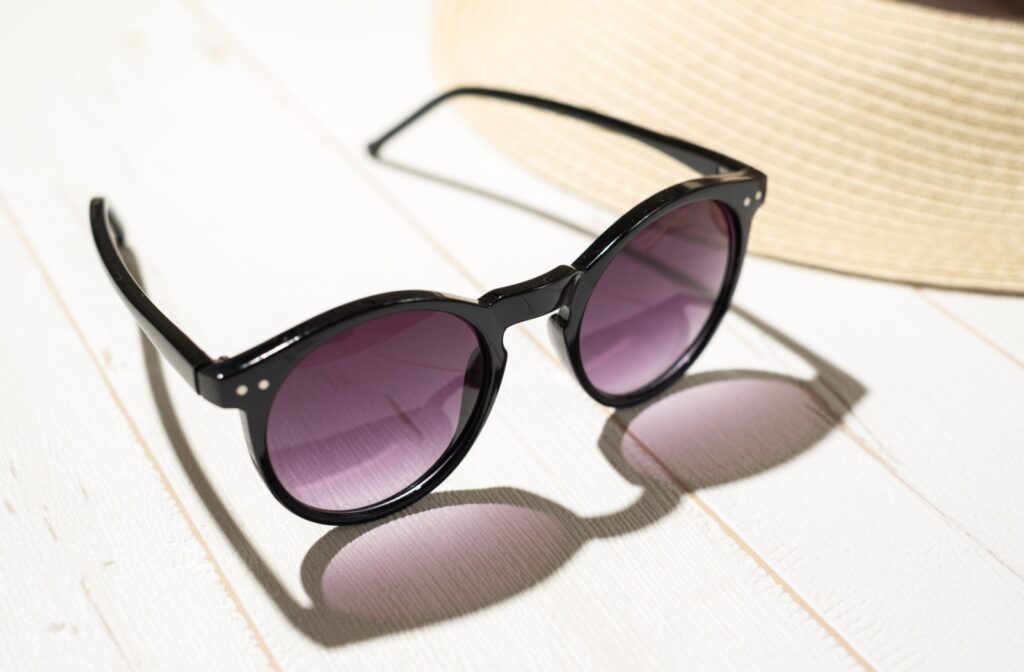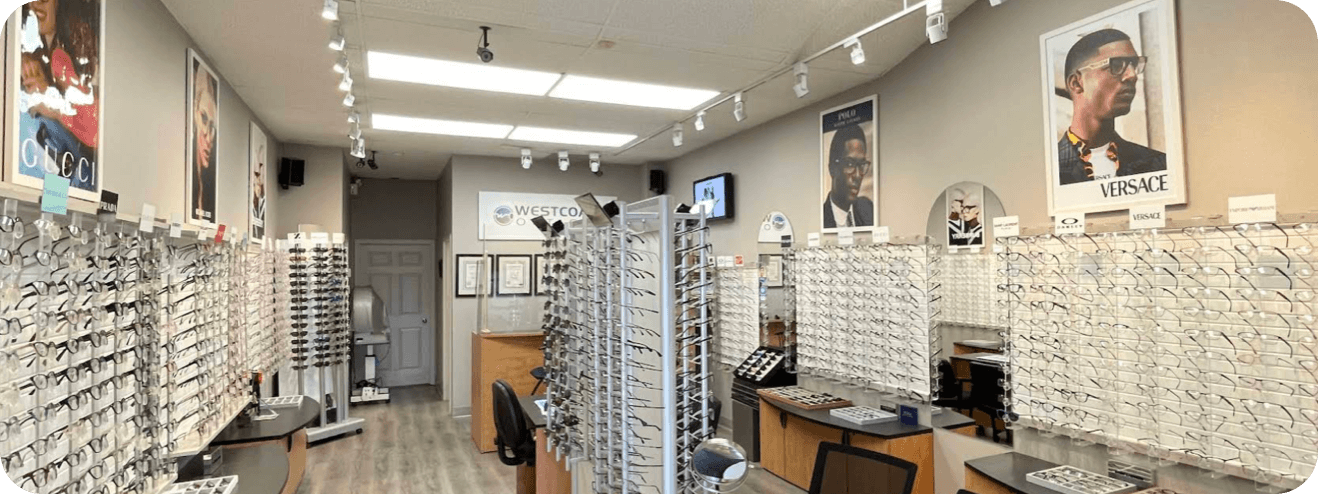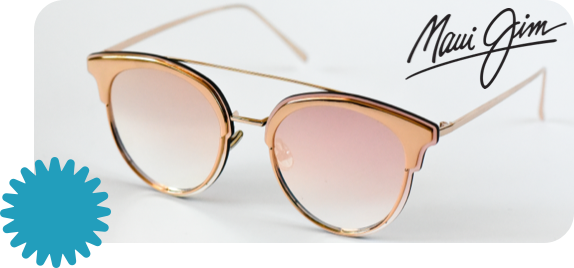With so many terms and technologies floating around, even something as simple as choosing sunglasses can become confusing. But the truth is that choosing the right sunglasses is not just about style; it’s about protecting your eyes from potential damage. In a nutshell, UV protection is responsible for blocking UV radiation from entering your eyes, and polarized lenses help reduce glare.
Both are important in many cases, especially UV protection, so you shouldn’t have to choose 1 or the other. Many high-quality sunglasses include both lens technologies. If you purchase your sunglasses from your eye doctor, you can even get them fitted with your prescription, so you don’t have to choose between seeing clearly or protecting your eyes from the sun.
How Important Is Wearing Sunglasses Outdoors?
How often do you wear sunglasses when you’re outside? The answer should be always or as much as possible.
Whether you’re sipping coffee on a patio or hiking under a glaring sun, sunglasses are more than just a fashion accessory. They’re essential for shielding your eyes from potential harm.
Exposing your eyes to the sun’s harsh UV rays over time can increase your risk of several vision-threatening eye diseases and conditions. Investing in the right sunglasses can cut your risk and help you maintain good vision for years.
The Sun & the Eye Damage It Can Cause
The sun emits powerful ultraviolet (UV) radiation that can directly damage sensitive parts of your eyes, including the cornea, lens, and retina.
Long-term exposure to UV rays can cause:
- Photokeratitis (sunburn of the eye): Causes pain, redness, and temporary vision loss
- Cataracts: A clouding of the eye’s lens, which can blur vision
- Macular degeneration: A progressive disease that affects your central vision
- Pterygium (surfer’s eye): A growth on the conjunctiva that can impair vision
The good news is that you can minimize these risks with proper eye protection.
What’s the Difference Between Polarized & UV Protection?
Here’s where things can get confusing. Both polarized lenses and UV protection lenses exist to make your time in the sun safer and more comfortable. But they tackle different challenges.
Understanding the distinctions will help you choose lenses that best suit your outdoor lifestyle.
What Are Polarized Sunglasses?
Polarized sunglasses are designed to reduce glare. They have a special chemical coating that filters out horizontally reflected light.
Imagine a sunny day at the beach or by the lake. That intense glare bouncing off the water can be blinding. Polarized sunglasses block this glare, resulting in a clearer, more comfortable viewing experience.
Advantages of polarized sunglasses include:
- Reduced glare: Provides sharper, clearer vision during daytime activities, especially near water or on the road
- Improved colours and contrast: You’ll notice brighter and more vivid colours
- Reduced eye strain: Less squinting can mean a more relaxed time outdoors
- Perfect for outdoor sports or driving: Helps detect finer details, making activities like fishing, boating, and driving easier

While fantastic for reducing glare, it’s essential to remember that polarized lenses do not protect your eyes from UV radiation by default. They focus on clarity and comfort but are not a replacement for UV-blocking lenses.
What Are UV Protection Sunglasses?
UV protection sunglasses are designed to shield your eyes from harmful UV radiation. They block UVA and UVB rays to prevent long-term damage to your eyes.
When shopping for UV sunglasses, always check the label to ensure they provide 100% UV protection (sometimes listed as UV400) or 100% protection against UVA and UVB. Anything less won’t offer complete coverage.
The advantages of UV protection sunglasses include:
- Protects eye health: Safeguards your eyes from cataracts, macular degeneration, and photokeratitis
- Blocks both UVA and UVB rays: Ensures full-spectrum protection
- Widely available: Many sunglasses prioritize UV protection as a standard feature
If you choose UV protection without the glare reduction of polarization, there are some disadvantages:
- No reduction in glare: UV-blocking lenses don’t filter out reflective glare from water, snow, or glass
- No enhanced contrast or colour: While protective, these lenses won’t provide the visual clarity of polarized lenses
How Polarization & UV Protection Work Together
You don’t need to choose one or the other. Many high-quality sunglasses combine both polarization and UV protection in a single pair. By combining these technologies, you can reduce glare while also shielding your eyes from harmful UV rays.
Whether you’re driving, skiing, or simply walking outside, sunglasses that offer both features provide the ultimate combination of comfort and safety. And shopping for sunglasses with your eye doctor means you can get them with your vision prescription as well.
Things to Remember When Shopping for Sunglasses
Not all sunglasses are created equal. When shopping for your next pair, keep these tips in mind:
- Check for 100% UV protection: Look for a label that says 100% UV protection or UV400.
- Look for polarized labels: Most polarized lenses will indicate their presence.
- Test the sunglasses for glare reduction: If you’re in-store, try their effectiveness by looking at reflective surfaces (a shiny floor or window works well).
- Consider your lifestyle: If you spend a lot of time fishing, driving, or near reflective surfaces, polarized lenses are beneficial.
- Pick a shape that covers well: Wraparound sunglasses or larger frames provide more coverage from peripheral UV rays.
- Check for durability and lens material: Polycarbonate lenses are lightweight, while glass offers superior clarity.
Protect Your Eyes Every Time You Step Outside
Choosing between polarized sunglasses and UV protection doesn’t have to be challenging. The ideal solution is a pair that offers both features, giving you the best of both worlds. By investing in high-quality sunglasses, you’ll not only enhance your outdoor experience but also protect your eyes for years to come.
Stop by and chat with our experienced team at West Coast Optical for more advice on eye care or to explore options for polarized and UV-protective sunglasses. And if it’s time to update your prescription before you invest in new sunglasses, book an appointment today.















